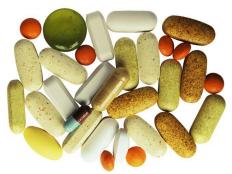Microalgae: Superfood or Supplement Scam?
A registered dietitian looks at whether or not these so-called superfoods live up to the hype.

marekuliasz
Seaweed is something you’ve likely enjoyed eating when wrapped around your sushi roll; but how about microalgae? Yes, algae, as in tiny freshwater seaweed. We’re seeing microalgae added to supermarket foods from snack bars and pizza crusts to almost every ‘green smoothie’ mix available. But is this so-called superfood worth the value-added pricing?
What is Microalgae?
Two of the most popular types of microalgae are spirulina and chlorella. Spirulina, a tiny blue-green plant grown in fresh water lakes is named after its spiral shape. Chlorella is boldly green, also grown in fresh water, and named for its rich content of chlorophyll.
What are its benefits? Spirulina and chlorella are over 50% protein (by weight) and contain all eight essential amino acids; powdered forms can contain up to 3 grams of protein per teaspoon. Microalgae contain antioxidants and have been shown to help lower LDL cholesterol, improve immune function, and may even improve allergies. Some studies have shown it to bind to heavy metal toxins to aid the body in removal.
“One of the active components in chlorella is chlorophyll, which is also found in leafy vegetables like parsley and kale; it helps gut health by balancing fluid levels and aiding with regulation," explains registered dietitian Gretchen Brown, blogger at Kumquat - A Gluten-Free Blog. "I also used chlorella when I was pregnant to help promote healthy blood-building.”
Like chlorella, spirulina contains the antioxidants beta-carotene and zeaxanthin, which help protect against cellular damage. “Spirulina also has energizing B vitamins, vitamin K, and the minerals magnesium, copper, zinc, selenium and iron. It even contains the essential fatty acids, EPA and DHA, which have been found to support brain and heart health,” says registered dietitian Lindsey Bristol, MS, RD at Swanson Health Products.
Any Cautions?
“Depending on how the microalgae is grown, it is possible for it to be contaminated with toxins which can cause liver and nervous system damage,” cautions Jenna Gorham, registered dietitian at Jenna Gorham Nutrition. "Because of this, it's important to purchase from a reputable supplier.” Side effects could include allergic reactions, diarrhea, nausea, or vomiting. You can check the safety of individual brands at ConsumerLab.com.
How does it taste? Microalgae usually have a ‘grassy’ flavor. “I buy the chlorella with a spearmint flavoring,” says Brown, “So it is a nice little addition to a glass of ice water sipped throughout the day; if you don't mind drinking green water!” You can also sprinkle it into chia puddings, smoothies, salad dressings, and other cold food, as it should not be heated to preserve nutrients.
“Microalgae also works great as a natural food dye,” says Gorham, “You may have seen it on the trendy unicorn toast used to color cream cheese or yogurt.” It can also easily be added to homemade granola bars and energy bites.
How is it Eaten?
Microalgae is a popular ingredient in green smoothie mixes. It can also be found in some specialty bars and snacks like spirulina bites, spirulina chips, pizza crust, wraps, and banana crisps.
Microalgae supplements can be found in a wide variety of powders and pills, including vegan omega-3 supplements and liquid chlorophyll supplements. Two popular products used in a small (positive) study with fibromyalgia patients are Sun Chlorella and Wakasa Gold.
Serena Ball, MS, RD is a food writer and registered dietitian nutritionist. She blogs at TeaspoonOfSpice.com sharing tips and tricks to help families find healthy living shortcuts. Follow her @TspCurry on Twitter and Snapchat.
Related Links:































